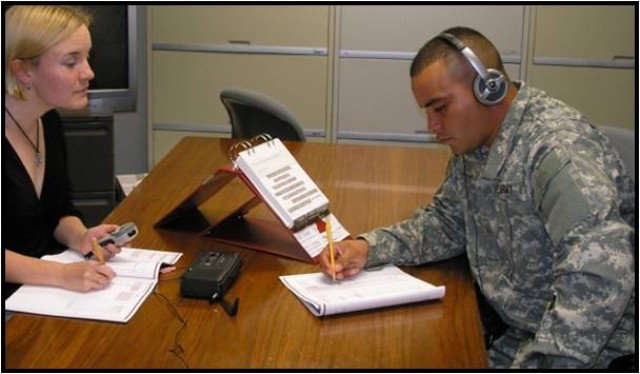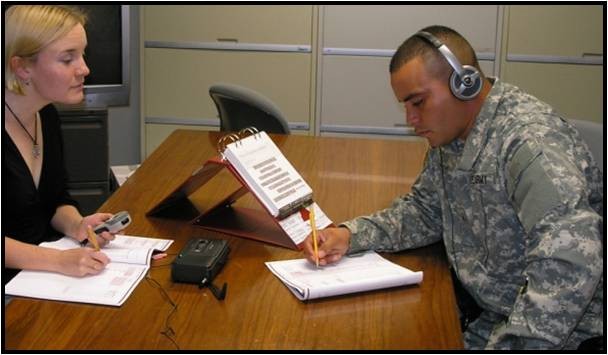FORT SAM HOUSTON, Texas -- Researchers recently discovered operating room specialist students having trouble passing the course may actually have difficulty hearing and, as a result, comprehending the material.
During a 2006 study of student attrition rates examining personal characteristics as related to academic performance, researchers found visual learners achieved higher scores than their counterparts who relied on verbal or auditory cues for information.
Further study indicated that students in the 68D pipeline had lower than expected grades on auditory attention tests.
The findings were surprising said researcher Petra Alfred, who explained those students at risk for success in the course were not able to discriminate between certain word sounds and environmental noise.
Lead investigator doing the auditory research, Alfred is part of a team at the Army Research Laboratory-Army Medical Department Field Element at Fort Sam Houston currently looking for methods to help military students learn more quickly and retain information more thoroughly.
Alfred's paper on this work, "Auditory Discrimination & Academic Performance" explores the relationship between the ability to perceive different sounds from background noise, key demographic variables such as race and gender, and academic performance among 68D trainees.
The paper will be a chapter in "Advances in Understanding Human Performance: Neuroergonomics, Human Factors Design, and Special Populations."
Using the Woodcock Johnson III Test of Auditory Attention, Alfred compared 48 trainees from the 68D course: 25 students deemed high-risk who failed the course and 23 students deemed low-risk who carried an A or B average.
Students listened to similar-sounding words such as cat or hat spoken over progressively louder background noise; then pointed to a picture of the word they thought they heard.
"One type of discrimination is the ability to discern sounds, for instance 'P' versus 'B,'" explained Dr. Valerie Rice, co-researcher on the project and chief of the U.S. Army Research Laboratory-Human Research and Engineering Directorate's field office at Fort Sam Houston.
"If you're not paying very close attention, or have auditory processing problems you're not going to be able to differentiate between a hat and a cat or something that's really close, especially when the background noise is really loud," Alfred said, comparing the test to speaking with someone in a loud restaurant.
"It's hard to tell if a person's saying one word or another word and that's what we're looking at."
Another surprising finding was that female Caucasian students scored much lower than male Caucasian students, so regularly in fact that Alfred was able to predict failure and success based on race, gender and risk status.
Anomalies in Alfred's findings included one student whose cultural background included storytelling. She did quite well with the test yet failed the course; while another who was passing the course failed the test because English was her second language.
Though she could predict success based on testing, Alfred said students who have not been tested may be unaware of hearing challenges and instructors may never notice problems.
Auditory attention or discrimination testing, such as the Woodcock Johnson test, looks at cognition not hearing and differs from the tonal testing all military members receive when entering service.
"The only reason it came to light here was because we were doing a research study and that happened to be one of the [tests] we were using on our cognitive evaluation," Alfred said.
Not quite able to pin down the causes of auditory deficiencies in the 68D trainees, Alfred postulates students might have attention issues related to their environments and the abundance of technology.
"You would think it would make them better at being able to process because they have so many types of stimuli - TV, video games, phones - but it seems they tend to focus in on one thing at a time, at least that is what we were hypothesizing," Alfred said.
"I would have thought students the age of recent high school graduates would not have auditory discrimination challenges, given what I perceive is that generation's ability to multitask," said Maj. Robert Holcek, chief, Operating Room Branch in the Department of Nursing Science.
"This research has made us more aware of some of the challenges our students experience," Holcek said.
"All students are unique, even those that may not experience auditory discrimination challenges may experience other challenges. However, I believe not only our classroom, but Dunlap Hall provides students on Fort Sam Houston with a wonderful classroom environment."
Rice suggested giving students, who are auditory learners, short bits of feedback, or taping a lecture and listening again instead of using flip cards with the answers to study.
"It's not a matter of loudness," Rice said. "The more senses you use including [touch] the more likely you'll get it into long-term memory."


Social Sharing